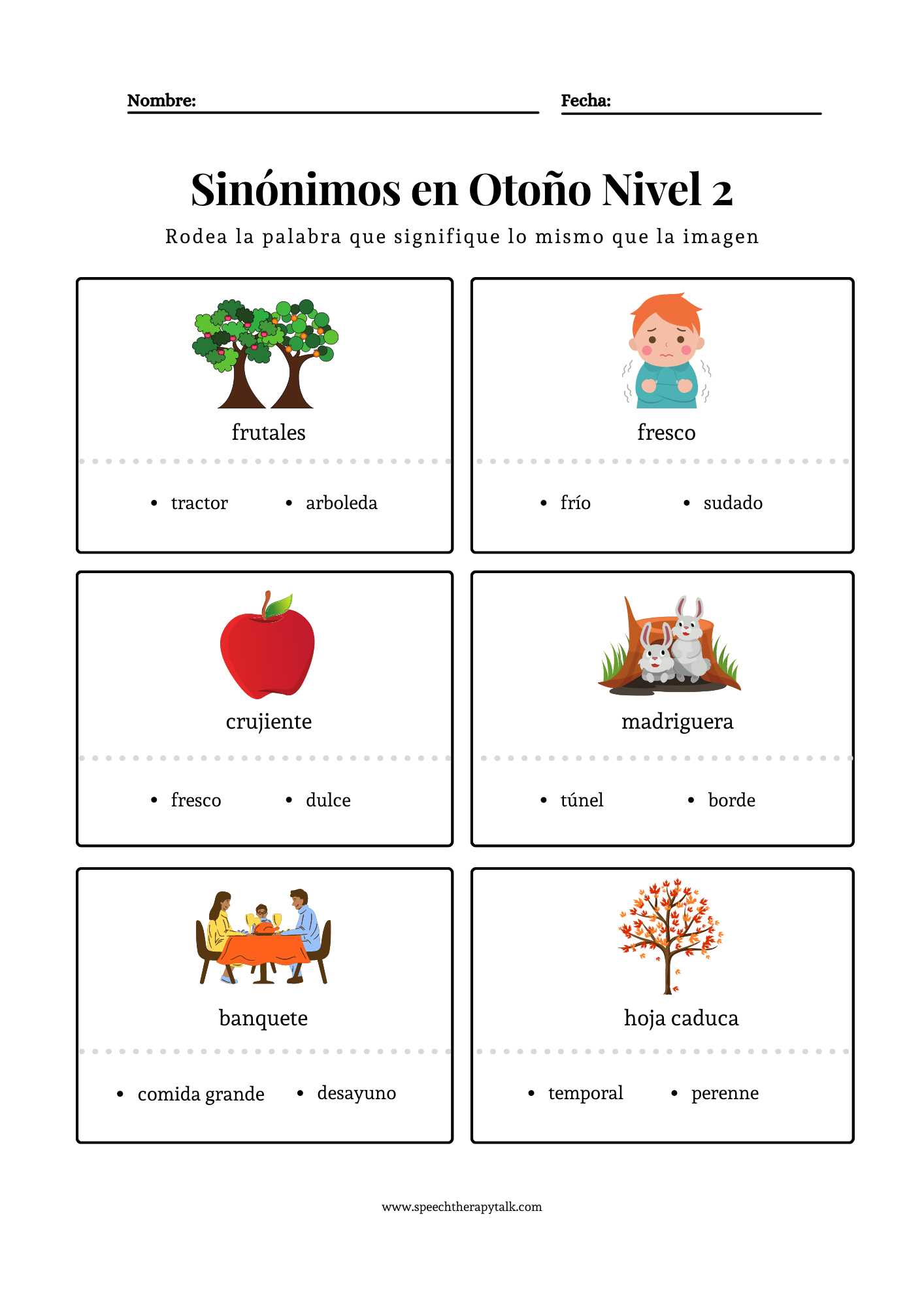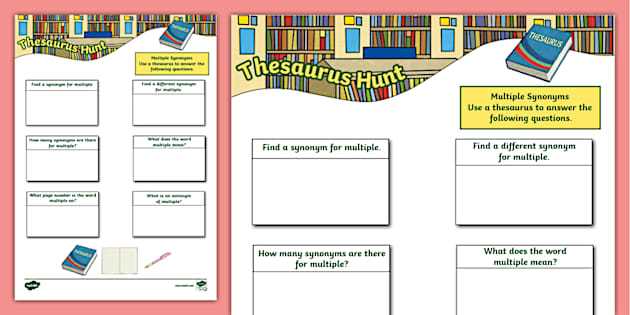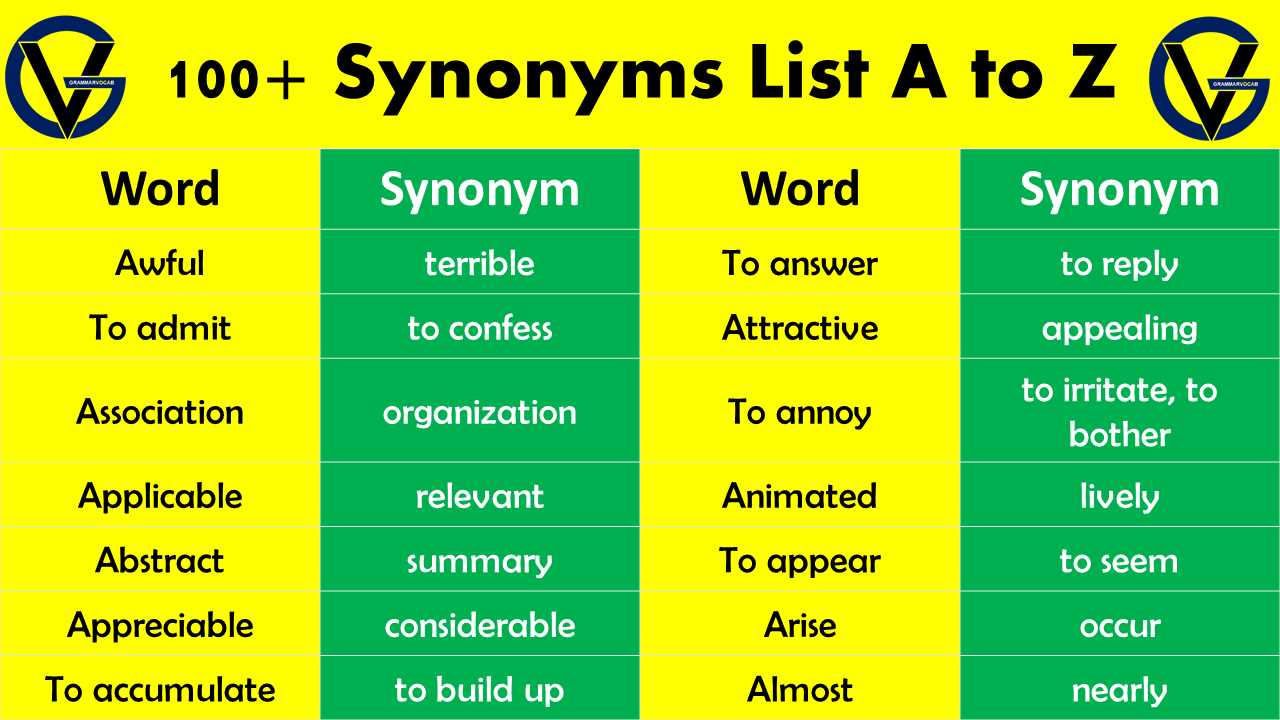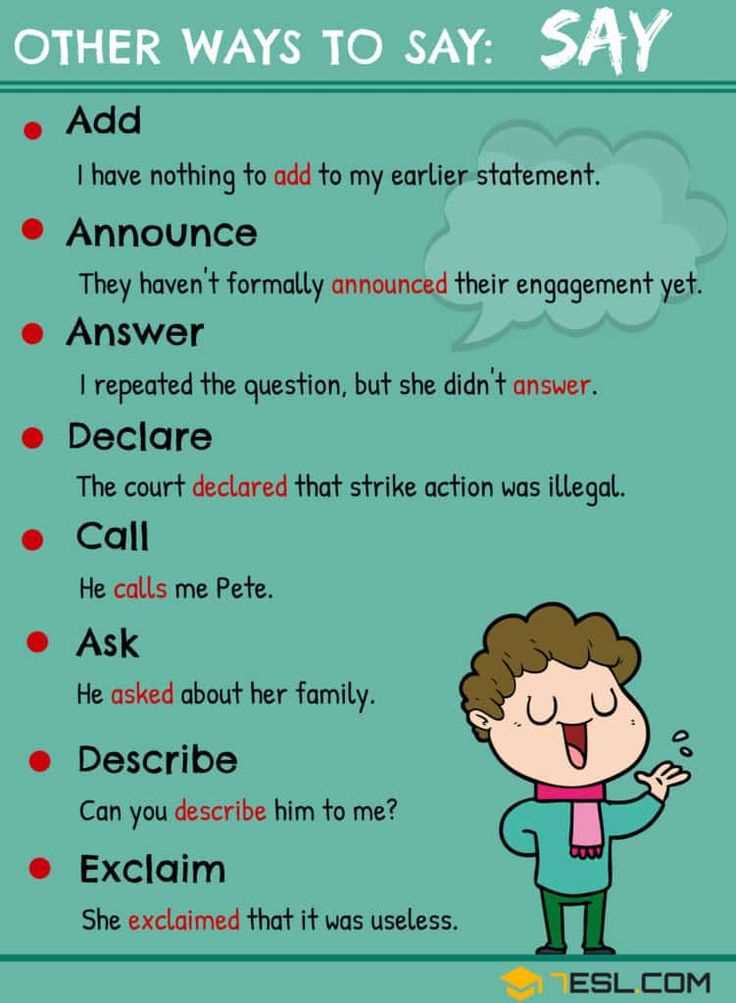
In communication, the way we express ourselves plays a crucial role in conveying meaning effectively. Choosing the right word can add nuance and variety to our conversations, allowing us to engage more naturally. By replacing a common phrase with an alternative, we can better suit the tone, context, and formality of the situation.
When we speak or write, there are numerous ways to show that we are providing a reply or reacting to a question. Expanding our vocabulary can make our language more interesting and dynamic. Whether in casual discussions or formal exchanges, knowing various expressions for replying can help enrich our communication.
Learning new terms for giving a response opens up opportunities to express ourselves with more precision and creativity. In this guide, we’ll delve into a variety of options that can be used depending on the situation and desired effect.
Different Ways to Say To Answer
When engaged in communication, it’s essential to express our reactions in varied ways to maintain a dynamic and natural flow of conversation. There are many alternatives to describe the act of responding, each carrying its own shade of meaning depending on context. Using a variety of phrases can enhance the clarity and tone of your message, making interactions more engaging and appropriate for different situations.
Common Alternatives in Daily Communication
In casual conversations, several expressions can replace the typical response, each giving a unique twist to the interaction:
- Respond – A simple, widely used term for reacting to a question or statement.
- Reply – Often used in both informal and formal contexts, implying a direct reaction to a prompt.
- React – Emphasizes a response to a situation, often implying a more emotional or immediate reaction.
- Address – Used when responding to a matter or issue, typically in more formal situations.
Formal Alternatives for Professional Contexts
In more formal settings, it’s important to choose words that reflect the level of professionalism required:
- Provide a response – A precise and formal expression, often used in written communication.
- Give a reply – Slightly more formal, often used in business correspondence or official settings.
- Clarify – Often used when offering a more detailed or thorough explanation in response to a query.
- Rejoin – Used to refer to a sharp or quick response, often in debates or discussions.
Common Alternatives for Responding
In communication, expressing a reply can be done in various ways, each suited to different contexts and tones. Whether you are in an informal conversation or a more formal setting, choosing the right expression helps convey your message more clearly and appropriately. Here are some common alternatives to consider when reacting to a question, request, or statement.
Replying is one of the most straightforward ways to indicate that you are providing a response. It is commonly used in both casual and formal interactions. Another option is responding, which can carry a slightly more formal tone, often used in written communication or official exchanges.
Reacting is a great choice when the response involves a quick or emotional reaction to something. This expression is often used in situations where the response is instinctive or involves an immediate reaction to an event or comment.
For more formal exchanges, addressing a query or situation is often preferred. This word emphasizes the act of directly dealing with an issue or providing a structured response. In written correspondence, you may also see phrases like providing a reply, which is a neutral yet professional way to describe offering a response.
Lastly, when the response involves clarifying or explaining something in more detail, clarifying is a useful term. It implies that the response goes beyond a simple reaction and offers further information to ensure understanding.
Words That Mean To Reply
When engaging in conversation, there are various terms that can describe the act of providing a response. Depending on the situation, some words are more fitting than others, reflecting the tone, urgency, or formality of the exchange. Here are several options to express the idea of replying in different contexts.
Respond is one of the most common and versatile terms. It is used in both casual and formal settings, indicating a general act of replying to a prompt or query. Another frequent choice is react, which often implies a quicker or more immediate reply, especially in response to an event or stimulus.
Reply is a straightforward and neutral word, widely used in everyday interactions. It is simple and direct, making it suitable for most situations. When the context involves formal correspondence, provide a response may be preferred, as it conveys a more professional tone.
Rejoin typically refers to a more pointed or quick reply, often used in discussions or debates where the response is sharp or immediate. Clarify is another useful option when the response involves offering more details or explanation to ensure understanding.
Expressing an Answer in English
In English, there are numerous ways to express a response depending on the formality, context, and tone of the conversation. By using varied expressions, you can convey your message more precisely and effectively. Whether you’re replying in casual dialogue or offering a formal reply, it’s essential to choose the right words to suit the situation.
Common Phrases for Replying
Different situations require different expressions. Below is a table showcasing several common phrases and their uses:
| Expression | Context |
|---|---|
| Respond | Used in both formal and informal contexts, indicating a general reaction to a query. |
| Reply | Neutral term, suitable for everyday conversations and correspondence. |
| React | Typically used when the response is more immediate or emotional. |
| Clarify | Used when additional details are provided to explain or ensure understanding. |
| Address | Commonly used in more formal contexts when dealing with a specific issue or matter. |
Formal and Informal Alternatives
In more formal situations, you may want to choose terms that convey professionalism. For example, provide a response or give a reply are appropriate when engaging in business communication or official interactions. On the other hand, in informal conversations, words like react or reply are commonly used to express a quick or casual response.
Varying Your Vocabulary for Answering
Using a variety of expressions when providing a response can help make your communication more dynamic and engaging. By switching up the words you use, you not only avoid repetition but also tailor your responses to better fit the context. Whether speaking casually or in a formal setting, a rich vocabulary can enhance the clarity and tone of your replies.
Here are some alternatives that can be used in different situations:
- Respond – A versatile option, suitable for both formal and informal contexts, indicating a general reply.
- React – Best used when the response involves a more immediate or emotional reaction to something.
- Reply – Commonly used in everyday conversation, ideal for direct, simple responses.
- Clarify – Useful when providing further details or elaborating on a topic to avoid misunderstandings.
- Rejoin – Implies a sharp or quick reply, often used in debates or discussions.
Additionally, some expressions are more fitting for specific scenarios:
- Provide a response – A more formal and neutral phrase, often used in professional or written communication.
- Address – Often used when responding to a concern or issue in a more structured or formal way.
- Give a reply – Similar to respond, but can sound slightly more formal or deliberate.
By integrating these alternatives into your communication, you can improve the impact of your responses and ensure that they are fitting for the context.
How to Use Synonyms for To Answer
Incorporating different expressions to respond can add depth to your communication and help tailor your message to the situation. By using a variety of terms, you can convey your message more precisely, whether you’re engaging in a casual conversation or addressing a formal inquiry. Understanding when and how to use each term is key to enhancing the clarity and impact of your reply.
Here are some tips on how to effectively incorporate these alternative expressions into your conversations:
- Consider the context – Choose the most appropriate term based on whether you are in a formal, professional, or casual setting.
- Be mindful of tone – Some words, like react or rejoin, imply a quicker or more emotional response, while others, such as provide a response, are more neutral and formal.
- Use variety – Avoid repeating the same word by mixing in different expressions, like reply for everyday use and clarify when providing more details.
- Fit the expression to the situation – For instance, address is more suitable for handling formal matters, while react fits well in informal settings where immediate feedback is expected.
By applying these strategies, you can enrich your responses and make your communication more dynamic and context-appropriate.
Substitute Terms for Giving Responses

When engaging in communication, using a range of expressions to provide feedback or react to a query can help make your conversations more varied and interesting. There are several substitute terms that allow you to express your reaction in different ways depending on the formality, tone, and context of the exchange. Choosing the right term not only keeps your communication engaging but also ensures your message is clear and appropriate.
Common Substitute Terms
Here are some widely-used terms that can replace the act of giving a response:
- Respond – This is a neutral term suitable for both casual and formal situations, commonly used in both spoken and written communication.
- React – Typically used when the reply involves an immediate or emotional reaction to something, often used in informal settings.
- Reply – A simple, direct word commonly used in day-to-day conversations and interactions.
- Rejoin – Implies a quick, often sharp response, frequently used in debates or discussions.
Formal Alternatives for Specific Contexts
In more formal or professional contexts, you may want to opt for terms that convey a sense of structure and professionalism:
- Provide a response – A neutral but slightly formal expression, ideal for business or written communication.
- Give a reply – Similar to respond, but may carry a slightly more deliberate or formal tone in certain contexts.
- Address – Often used when responding to an issue or concern, particularly in formal settings like meetings or official correspondences.
Alternative Phrases for Answering Back
When engaging in conversations, it’s often useful to express a response in various ways, especially if you want to convey a different tone or nuance. Depending on the situation, there are several phrases you can use to communicate your reply effectively. Whether you’re responding in a casual chat or addressing a formal inquiry, having a range of alternatives can make your communication more dynamic and fitting.
Here are some alternative phrases that can replace the act of replying:
- Get back – This phrase is often used in informal settings when referring to returning a response or reacting after a delay.
- Come back – Similar to get back, it is commonly used in both casual and semi-formal conversations, typically in response to a statement or question.
- Respond in turn – A slightly more formal expression, useful when discussing a series of replies or reactions in response to multiple inquiries.
- Give a retort – This phrase implies a quick, often sharp reply, typically used in debates or when reacting to an argument.
- React accordingly – This phrase is useful when describing a response that is based on a particular stimulus or condition.
Using a variety of these expressions can help to convey your message in a way that matches the tone, formality, and context of your conversation.
Creative Ways to Say Reply
When expressing a response, using creative alternatives can make your communication more engaging and memorable. Instead of relying on the same old phrases, you can explore a variety of expressions that add personality or emphasis to your reply. These alternatives can be particularly useful in writing, storytelling, or any situation where you want to keep the conversation fresh and lively.
Here are some creative ways to convey a reply:
- Chime in – A casual and often spontaneous way to join a conversation or provide your thoughts.
- Weigh in – Used when adding your opinion or perspective on a topic, especially in discussions or debates.
- Give feedback – A more formal expression, typically used in professional or constructive settings where you’re offering your evaluation or thoughts.
- Join the conversation – A phrase that implies contributing to an ongoing dialogue, often used in more informal contexts.
- Speak up – A phrase that suggests giving a vocal or assertive response, commonly used when someone needs to express their opinion.
- Come back with – Implies a more direct or sharp response, often used in back-and-forth exchanges.
These creative alternatives allow you to vary your responses and keep your communication engaging, no matter the situation.
Understanding Different Answering Verbs
There are numerous verbs in English that express the concept of responding, each with its own subtle nuance or specific context. Understanding these verbs helps you choose the most appropriate word depending on the situation, whether you’re engaging in a casual conversation, providing a formal reply, or reacting to a situation. By expanding your vocabulary in this area, you can communicate more effectively and precisely.
Common Verbs for Responding

Here are several verbs that convey the act of replying, each suited for different contexts:
- Reply – The most common verb, suitable for a wide range of situations, both casual and formal.
- Respond – Often used interchangeably with reply, but may carry a slightly more neutral or formal tone.
- React – Typically used when the response is immediate or involves some emotional or instinctive reaction.
- Rejoin – Often used when making a sharp or quick comeback in a conversation, especially in debates.
- Clarify – Used when providing a more detailed explanation or elaborating on a previous statement or question.
Specialized Verbs for Different Contexts
Some verbs are more specific and are used in certain contexts where a precise kind of response is needed:
- Defend – Used when responding to a challenge or attack, often in discussions or debates.
- Address – More formal, often used in professional settings or when responding to a concern or issue.
- Confirm – Used when verifying information or affirming something in response to a question or request.
- Disagree – When offering a response that contrasts or opposes what was said previously.
- Elaborate – To provide more detail or depth in response to a question or topic.
By understanding the subtle differences between these verbs, you can better tailor your responses to match the tone and context of any situation.
Better Choices Than To Answer
While the act of responding is a fundamental part of communication, there are instances where alternative expressions can be more effective or appropriate. Using varied terms can enrich your conversations and writing, making them more dynamic and precise. This section explores some better options that may suit different contexts, offering flexibility in how you convey your reactions or opinions.
Here are some options that can replace the more generic term for responding, each with its own nuance:
| Choice | Context | Example |
|---|---|---|
| Clarify | When providing additional details or clearing up confusion. | Can you clarify your earlier statement? |
| Confirm | When affirming or verifying information. | Let me confirm the details of your request. |
| Address | Used when dealing with or responding to a specific issue or concern. | I will address the points raised in your letter. |
| React | When responding to something quickly, often involving emotion or instinct. | He didn’t react well to the feedback. |
| Reply | A neutral term, suitable for a wide range of scenarios. | She didn’t reply to the email right away. |
| Respond | Similar to reply but slightly more formal or neutral. | We will respond to your query within 24 hours. |
Choosing the right term for a given context helps convey your message more effectively, providing clarity and adding depth to your communication.
Expressing a Response with Synonyms
In communication, varying the way you express your reaction can enhance clarity and engagement. There are several ways to convey your thoughts or opinions in response to questions, statements, or situations. Choosing the right expression helps tailor your message to the tone, formality, and intent of the conversation, making your reply more suitable to the context.
Common Expressions for Reacting
Here are a few common ways to express a response, each providing a different nuance or formality level:
- React – Often used when referring to an immediate or emotional response to something.
- Respond – A general term used for offering a reply, suitable in both casual and formal contexts.
- Reply – A neutral expression, appropriate in both spoken and written communication.
- Rejoin – Used when replying quickly, often in a more pointed or direct manner, especially in discussions or debates.
Advanced Alternatives for More Nuanced Responses

For more specific situations, these alternatives can be particularly useful:
- Clarify – Used when you want to provide further explanation or make something clearer.
- Elaborate – Implies providing a more detailed or expanded explanation in response to a question or statement.
- Confirm – Often used when verifying facts or acknowledging details presented in a conversation.
- Defend – A strong choice when your response is aimed at justifying or supporting a previous statement or position.
By using these expressions appropriately, you can express your reaction more effectively, tailoring your response to the specific context and your intent in the conversation.
Choosing the Right Word for Replying
In any conversation, the choice of words used to respond plays a crucial role in conveying the intended message. Selecting the right term depends on various factors such as the tone, context, and formality of the situation. Whether you’re having a casual chat or engaging in a formal discussion, knowing which expression to use can help ensure that your message is both clear and appropriate.
Factors to Consider When Choosing a Word
When deciding how to respond, it’s important to consider the following elements:
- Context – The situation dictates whether a more formal or casual response is needed.
- Tone – Some words convey politeness or assertiveness, so it’s important to match the tone of your response to the tone of the conversation.
- Clarity – Some terms are more precise and clear, while others may introduce ambiguity. Choose words that avoid confusion.
Commonly Used Terms for Replying
Here are some common choices that vary in formality and context:
- Respond – A neutral, formal term suitable for most situations.
- Reply – A simple, commonly used term that fits both casual and formal contexts.
- Retort – Often used in situations where the response is quick or sharp, typically in debates or arguments.
- React – Implies an immediate, often emotional or instinctual response to something.
By choosing the most fitting word for the situation, you can improve the effectiveness of your communication and ensure your message resonates with your audience.
Synonyms for Answer in Conversations
In everyday conversations, the way we respond to others can vary depending on the situation and the relationship between the speakers. Whether you are agreeing, explaining, or just offering a simple remark, there are several ways to phrase your response to match the context and tone of the conversation. The key is choosing expressions that appropriately reflect your intent, whether you’re being casual, formal, or even humorous.
Common Phrases Used for Responding
Here are some common phrases that can be used to express a response in various settings:
- React – Suitable for situations where your reply is influenced by emotions or immediate impressions.
- Reply – A straightforward choice, often used in both casual and formal conversations.
- Respond – A more neutral option, commonly used in professional or polite exchanges.
- Comment – When offering your thoughts or observations on a subject.
- Explain – Used when you need to provide clarification or more detail about something.
When to Choose Specific Responses
Knowing when to use different terms can make your communication more effective. For example:
- Clarify – Ideal when the situation requires more detailed explanation or when something needs to be made clear.
- Defend – Useful in debates or when justifying a position or statement.
- Counter – Best used in response to someone challenging or opposing a point you’ve made.
- Accept – When agreeing with something or acknowledging a statement or idea.
By varying your responses with these alternatives, you can convey your message more precisely and match the tone of the conversation effectively.
Using Varied Terms for Answering
When engaging in conversation, the words we use to respond can significantly shape the flow and tone of the interaction. By choosing different expressions, you can avoid repetition and adapt your responses to suit the context. Whether you’re providing feedback, offering an explanation, or simply acknowledging something, diversifying your vocabulary can make communication more interesting and effective.
Why Variety Matters in Responses
Using varied expressions for responding can make your communication more dynamic and engaging. Here are a few reasons why varying your vocabulary is important:
- Context Adaptation – Different terms are more suitable for casual, formal, or professional settings.
- Clarity – Sometimes, a specific term can convey your meaning more clearly than others.
- Engagement – Changing up your responses can keep the conversation fresh and avoid sounding monotonous.
Common Ways to Express a Response

Here are several terms you can use depending on the situation:
- Clarify – When you need to make something clear or provide more information.
- Agree – To show you are in alignment with what is being discussed.
- Explain – Used when you wish to give a more detailed or thoughtful reply.
- Acknowledge – To show recognition or understanding of a statement or question.
- Discuss – When you engage in a more in-depth conversation or debate.
By choosing the most appropriate term for each situation, you can enhance the clarity and impact of your responses, making your communication more effective and nuanced.
Expanding Your Vocabulary for Replies
Having a diverse vocabulary for expressing responses not only makes your speech or writing more engaging but also allows you to convey your thoughts more accurately. By exploring different words and expressions for replying, you can adapt to various contexts and communicate with greater clarity. This expansion of your linguistic tools helps you avoid repetition and enhances your ability to express nuance and intention.
Here are some ways to broaden your vocabulary and improve your responses:
Learning New Verbs for Responding
Incorporating new verbs into your responses can add variety to your communication. These verbs allow you to choose the most fitting expression for the context, whether it’s casual, formal, or technical.
- Reply – A general term for providing a response.
- React – Used when responding emotionally or instinctively to something.
- Clarify – To make a statement more understandable or explicit.
- Address – Often used when speaking to a specific issue or subject matter.
- Confirm – To verify or validate information provided.
- Refute – When you counter or disprove a statement or argument.
Using Different Phrases for Reactions

Sometimes, the way you react to a situation requires more than a simple verbal response. In these cases, expanding your set of expressions can make your reply more meaningful.
- It makes sense – When you agree with something or find it logical.
- That’s correct – To affirm the accuracy of a statement.
- I’ll consider that – When you need time to think or reflect on something.
- Got it – A concise way of acknowledging understanding.
- I’ll get back to you – When more time is needed before providing a thorough reply.
Expanding your vocabulary for replies helps you respond more thoughtfully and effectively in any conversation. The more varied your responses, the more clearly you can express your ideas and adapt to different social or professional environments.